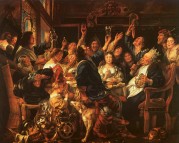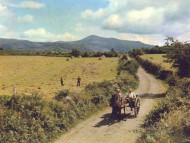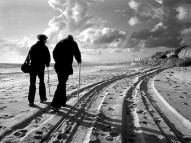Allegro Maestoso-Water Music (G.F. Handel) (Friendship)
A celebrated selection from 3 orchestral suites composed by G.F. Handel(1685-1759). First performed 7/17/1717 by a 50 piece ensemble on a special floating platform riding alongside King George I's barge up (and down) the Thames.
For (S)He's A Jolly Good Fellow (Friendship)
Said to be the second most sung song in the English language after "Happy Birthday." The melody's origins are from early 18th century France, the varying English words having evolved throughout the 19th century in Britain ("...and so say all of us...") and America ("...which nobody can deny..."). Genuinely old and used enough to be considered a "folk song."
Hail! Hail! The Gang's All Here! (Friendship)
1917 Tin Pan Alley standard. Music by Theodore Morse(1873-1924)borrowing directly from Sir Arthur Sullivan's "The Pirates of Penzance"(1879), lyrics by D.A. Esrom, pseudonym for Theodora Morse(1890-1953), wife of Theodore Morse. Ms. Morse also contributed lyrics to "Wonderful One," "Siboney," and "Three O'clock In The Morning."
Irish Blessing, An (Friendship)
So old, so universally quoted that it has no known origin, only that it's Irish. The music is original to this site.
My Buddy (Friendship)
Music by Walter Donaldson(1893-1947), lyrics by Gus Kahn(1886-1941), 1922. Between Donaldson & Kahn, separately and in collaboration, too many evergreens to list. "My Buddy" was routinely played in silent movie houses as the piano accompaniment for the film classic "Wings" (1927) set in WWI; and though written after the end of the conflict, its plaintive strains have always been associated with the Great War(1914-1918).
Perfect Day, A (Friendship)
Words & Music by Carrie Jacobs-Bond(1862-1946), multi-million seller, 1910, more successful than even her 1901 wedding classic, "I Love You Truly." (See Occasions/Wedding/Newlyweds and Holidays/Valentine's Day). Bond was the first woman in American songwriting to enjoy mass-market success.






